In the region worst hit by the earthquakes two years ago, Christians continue to help people rebuild their lives and overcome trauma in the aftermath of the disaster.
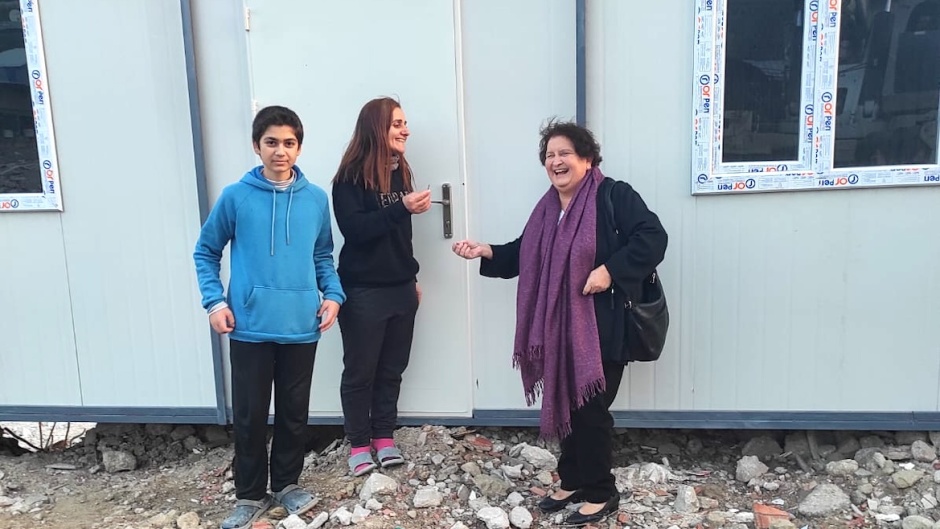 Debora, a Christian worker among the earthquake victims, accompanies a family as they receive the keys to a house.
Debora, a Christian worker among the earthquake victims, accompanies a family as they receive the keys to a house.
On 6 February 2023, two consecutive earthquakes of magnitude 7.8 and 7.5 on the Richter scale, struck southeastern Turkey and northern Syria.
It was an unprecedented catastrophe in the region: over 50,000 people died in Turkey alone, more than 107,000 were injured and around 9 million were directly affected.
The disaster caused the collapse of over 200,000 buildings, displaced millions of people and left behind a large-scale humanitarian crisis.
Among the hardest hit provinces was Hatay, and within it, Samandağ, a county where reconstruction is slow and daily life is still marked by precariousness.
Débora Novio, a volunteer and social worker working with the Foundation of the Protestant Churches of Turkey, has been working there for two years, alongside organisations such as Cecmavi in Barcelona and other collaborating organisations, accompanying the victims.
“Imagine a cemetery with 28,000 graves, all with the same date: 06.02.2023”,says Debora, describing the desolate landscape still visible in Hatay.
“Two years have passed, and although construction has started in Antioch, the demolitions in Samandağ have not been completed and the construction of houses is just beginning”, she adds.
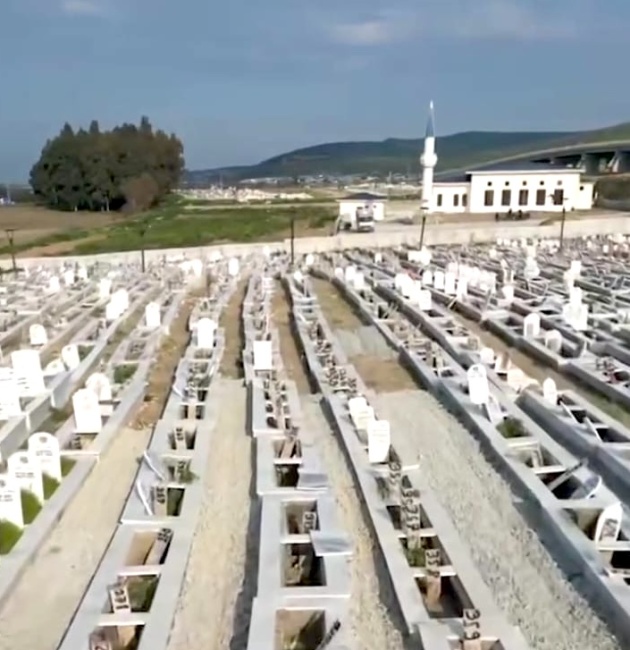
[photo_footer] One of the cemeteries with thousands of graves of those who died in the earthquake. [/photo_footer]
Many low-income families still live in tents, containers or small wooden houses, which are not legally recognised as housing, so they have no regular access to basic services.
“The law does not allow you to take electricity or water without an address, but it does not give those constructions that status either. So they pay huge fines just to have electricity”, explains Débora.
In addition to this, there are health and environmental problems. “Rats and snakes are everywhere”, she denounces.
There are also educational difficulties, because “the schools that collapsed have been replaced by others in distant neighbourhoods, but transport is a big problem”.
All of this in a context of skyrocketing inflation, which makes even the most basic things more expensive.
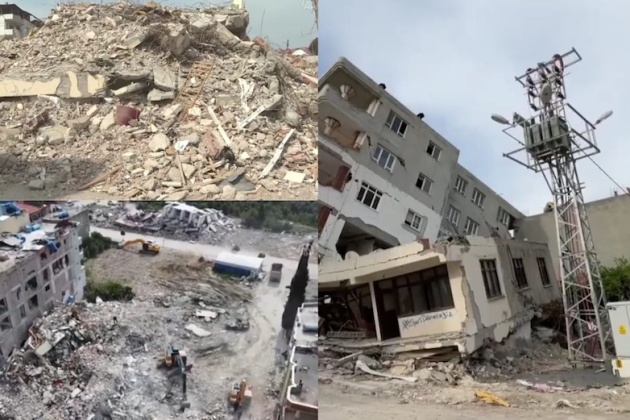
[photo_footer] Las tareas de reconstrucción son muy lentas y dificultosas, en medio de muchos escombros. [/photo_footer]
Despite this situation, humanitarian work has been constant. Since the beginning of the crisis, Debora and her team have distributed:
- over 400 small houses and containers
- 400 toilets and washbasins
- 2000 heaters
- more than 1000 fans
- 4000 pairs of shoes
- 3000 T-shirts
- 2000 blankets and sacks
- 2000 backpacks with school supplies
- and tens of thousands of boxes of food and cleaning supplies.
“The Lord has also allowed us to help with medicines for contagious skin diseases, especially scabies, which have spread due to the difficult hygienic conditions”, underlines Débora.
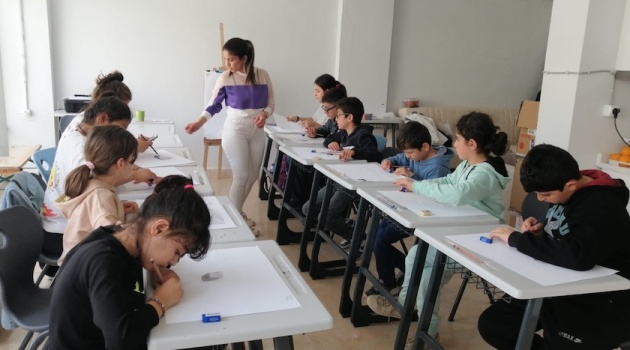
[photo_footer] A small room is used as a centre for various activities, also to strengthen the studies of children and young people. [/photo_footer]
The support goes beyond material things.
In rented premises in the city centre, the team offers activities for children and adults: classes in mathematics, drawing, English, music, and also emotional therapy. “Most of the volunteer teachers are from Samandağ”, points out Débora.
“From the beginning we have paid special attention to the children, who were quite neglected while the adults were trying to overcome the obstacles to a dignified life again. Whenever we can, we organise outdoor games, give them little presents, make them feel loved”.
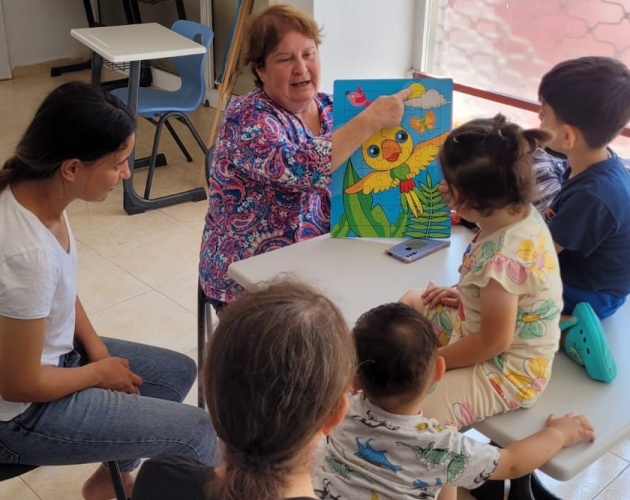
[photo_footer] The work of Debora and other workers is bringing intellectual, physical and emotional help to the victims. [/photo_footer]
The spiritual is also present in every aspect of the work they do.
“Since August 2023, we meet on Sundays to make God's precious character and the saving work of Jesus known. Many are moving forward on this spiritual journey”, explains Debora.
Among the many stories she has witnessed, Deborah tells us about Aliye, a woman widowed since 2013 who lost her two sons in the earthquake.
“They were each trapped in their own room under the rubble, talking to each other about the cold, the thirst... Aliye encouraged them by saying ‘Hang in there, they're going to pull us out’. On the fourth day they rescued her, but the children had already died”.
Today Aliye visits Debora every day and asks her for a packet of paper towels. “She needs them to wipe her tears at night”,she adds.
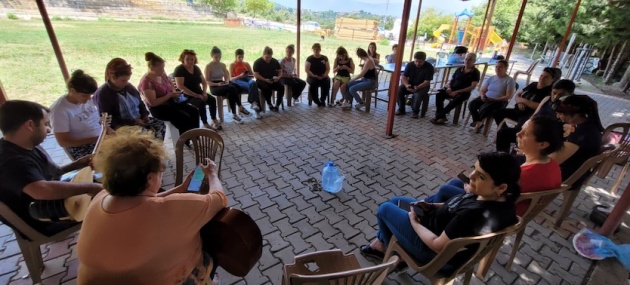
[photo_footer] On Sundays, they meet to share their Christian faith and hope in Jesus.[/photo_footer]
There are still many ongoing needs. One of them is treatment for Huda, the mother of a seven-year-old boy who stutters since the earthquake. Although he is intelligent, his slowness in expressing himself means he is classified as one of the least able.
“His mother takes him to a speech therapist, but she can no longer afford the €20 per session. If anyone wants to help, you can contact me and I'll put you in touch with the family”, says Débora.
Débora is grateful for the outpouring of love and support: “Thank you for keeping the earthquake victims in mind and giving us the opportunity to explain their needs. Thanks to all of you who have been praying to God for us and sending help. God be glorified”.
[analysis]
[title]Join us to make EF sustainable[/title]
[photo][/photo]
[text]At Evangelical Focus, we have a sustainability challenge ahead. We invite you to join those across Europe and beyond who are committed with our mission. Together, we will ensure the continuity of Evangelical Focus and our Spanish partner Protestante Digital in 2025.
Learn all about our #TogetherInThisMission initiative here (English).
[/text][/analysis]

Las opiniones vertidas por nuestros colaboradores se realizan a nivel personal, pudiendo coincidir o no con la postura de la dirección de Protestante Digital.
Si quieres comentar o